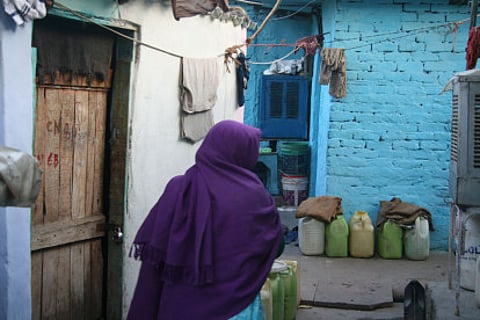Delhi rape: Who dreamed they could be capable of this?
Residents of the slum where four of gang-rape accused lived search for answers

New Delhi: They were the boys next door. A bit rough perhaps, a bit rude, prone to wasting money on cheap booze probably brewed in a backroom tub. But who dreamed they could be capable of something like this?
A few miles from South Delhi’s posh “farmhouse” estates, this part of the R.K. Puram neighbourhood was just another slum until mid-December, when a brutal rape awakened a nation long inured to the mistreatment of women. News crews soon traced four of the six alleged attackers to this community.
Satellite vans blocked the unpaved road to grab their 20-second bits and bites, fuelling national outrage among a middle class that drives past the slum, ignoring beggars tapping on the tinted windows of their imported cars. In no time, a coating of infamy settled over R.K. Puram, thicker than the polluted dust falling from the sky. Neighbourly reticence soon gave way to the lure of a few minutes of fame.
Curiosity
Heads peeked from doors spaced inches apart to volunteer a detail, a shading about former residents turned national pariahs. People recalled past brushes with their four infamous neighbours, trying to understand what could have motivated them to commit the crime they’re accused of.
Most here have never been to a mall, and they could never afford its cinemas. But they’ve been on many such buses. They imagine the pair realising that this was no ordinary commuter bus as the doors shut, curtains were drawn and the nightmare began.
R.K. Puram is one of numerous destinations for the river of migrants with cheap plastic luggage arriving each day from villages, looking to trade the slow life for a shot at a dream.
It comes down to luck, said tuk-tuk driver Chandrakesh Kumar, who wants to own a table and chair someday, maybe even a car. Those are aspirations the countryside doesn’t abide. Since the attack, residents said, R.K. Puram’s reputation has been tarnished.
Business student Deepak Kumar, 17, dreads the raised eyebrows and probing questions from prospective employers after he mentions his address. One bad fish can dirty the pond, it seems.
Heavier still is the burden on relatives of the rape suspects. Trying to fight the tide of scorn, to argue that blood is thicker than newsprint, is a losing battle.
Past offenders
A woman named Asha showed off her house, each of its two rooms barely larger than a double bed. Next door is the locked house of her now-imprisoned cousins, Mukesh and Ram Singh, who are accused of trading off driving duties to take turns raping the victim. Asha said the two had long shown disrespect for women, and once beat her husband.
A few days ago, a third Singh brother showed up after drinking too much, residents said, threatening to torch the neighbourhood for not siding with his brothers. The father arrived later, conceding that his sons should be punished, amid rumours of the family’s association with black magic.
The Singh brothers, bus drivers by trade, deserve what they get, many residents said. It’s likely that two other suspects, fruit seller Pawan Gupta and gym instructor Vinay Sharma, were dragged along by the others, they said. But if they had qualms, they should have fled and called the police, many insisted.
Sharma told his mother from prison that he had tried to leave but that the others threatened to kill him, residents said as they debated the line between evil and terribly bad judgment, a distinction of little interest to a nation bent on retribution.
In narrow lanes where women and children bustle to fill plastic containers at a solitary water tap, the fading winter light sent shards across a one-room house that sleeps six, now five, where frayed clothes and battered school bags hang on nails.
Three children with dirty faces said they missed Sharma, their jailed brother, and could not believe he’d do such a thing. The gym instructor faces life behind bars, even the gallows, for a night out with the wrong crowd.
The five adult suspects who face charges of murder, gang rape, evidence destruction and criminal conspiracy have entered not-guilty pleas in their fast-track trial.
A sixth suspect is to be tried in juvenile court. In response to public outrage, India pushed through laws that significantly increase the punishment for stalking, stripping a woman or carrying out an acid attack, and allow the death penalty for rapes that leave victims in a “persistent vegetative state.”



